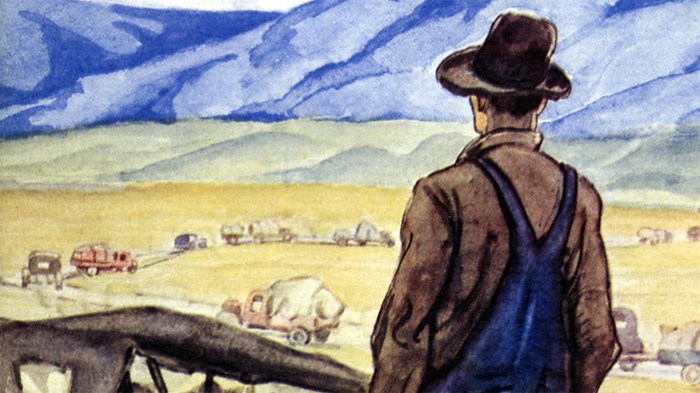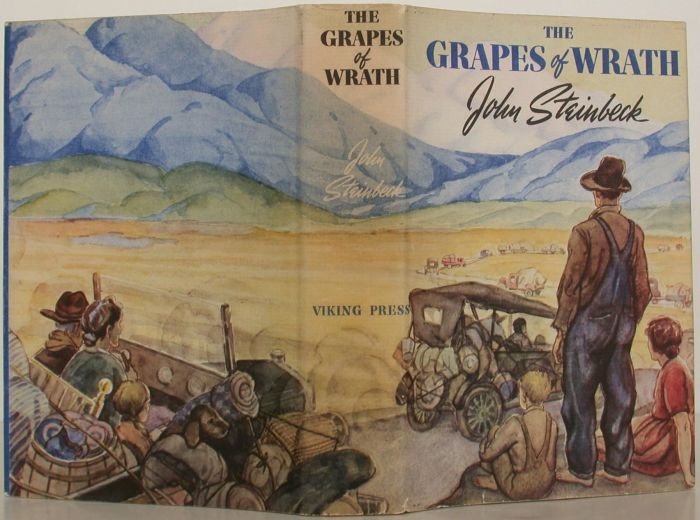Chapter 16 grapes of wrath – Chapter 16 of The Grapes of Wrath, titled “The Exodus,” marks a significant turning point in the novel. As the Joad family prepares to leave their home and embark on a journey to California, the chapter explores themes of displacement, resilience, and the struggle for survival.
The chapter’s title evokes the biblical Exodus,暗示着乔德一家的旅程将是一次充满艰辛和希望的旅程。离开家园的决定是艰难的,但干旱和沙尘暴的肆虐迫使他们踏上了未知的道路。
Chapter 16: The Exodus

The title of Chapter 16, “The Exodus,” evokes the biblical story of the Israelites’ departure from Egypt. This parallel suggests that the Joad family’s journey out of the Dust Bowl is a similarly momentous and transformative event. The chapter chronicles the family’s preparations for their departure, their journey to California, and their initial struggles to find work and shelter.
The symbolism of the turtle in the chapter is significant. The turtle is a slow-moving creature, and its presence suggests that the Joads’ journey will be a long and arduous one. However, the turtle is also a survivor, and its presence suggests that the Joads will ultimately overcome the challenges they face.
The Joads’ Departure: Chapter 16 Grapes Of Wrath

As the Joads prepare to leave their home, a profound sense of sadness and uncertainty engulfs them. The once-fertile land that had sustained their family for generations has become a barren wasteland, and the relentless drought has forced them to abandon their dreams and seek a new life elsewhere.
The Joads’ decision to leave is a testament to the devastating impact of the drought. Their crops have failed, their livestock has perished, and their livelihoods have been shattered. The dust storms that plague the land have become a constant threat, suffocating the air and eroding their spirits.
The Dust Storms
The dust storms in the chapter serve as a powerful symbol of the environmental and economic devastation wrought by the drought. The storms obscure the sun, casting an eerie darkness upon the land. They carry with them a suffocating dust that coats everything in its path, clogging lungs and obscuring vision.
The dust storms also represent the Joads’ sense of displacement and uncertainty. As they are forced to flee their homes, the storms become a metaphor for the chaotic and unpredictable nature of their journey. The storms strip away their sense of security and stability, leaving them vulnerable and adrift in a hostile world.
The Journey to California
The Joads’ journey to California is a harrowing one, filled with challenges and hardships. They face hunger, exhaustion, and discrimination. The journey transforms them as a family, as they learn to rely on each other and develop a deep sense of resilience.
Government’s Role
The government plays a significant role in the Joads’ journey. The Dust Bowl, which forces them to leave their home, is a result of government policies that promote unsustainable farming practices. The government also provides some assistance to the Joads along the way, such as food and shelter, but it is often inadequate and comes with strings attached.
The Arrival in California
Upon arriving in California, the Joads were confronted with a stark reality that shattered their initial expectations of a promised land.
First Impressions
Their initial impressions were of a vast, dry landscape, far removed from the lush fields they had left behind. The promised abundance seemed elusive, replaced by an oppressive dust that permeated the air and coated everything in a fine layer of grime.
Economic and Social Conditions
The economic and social conditions they encountered were equally disheartening. California’s agriculture was dominated by large-scale farming operations, leaving little opportunity for small-scale farmers like the Joads. The competition for jobs was fierce, and wages were meager.
Challenges Faced
The Joads faced immense challenges in finding work and housing. Employers exploited their desperation, offering them below-subsistence wages. The lack of affordable housing forced them to live in squalid migrant camps, where they were exposed to disease and unsanitary conditions.
The Joads’ struggles in Chapter 16 of “The Grapes of Wrath” resonate with the enduring divide between social classes. Just as the Joads faced discrimination based on their poverty, the characters in the “Are You a Greaser or a Soc?” quiz are you a greaser or a soc grapple with their place in a society that values wealth and status over humanity.
Ultimately, both stories highlight the devastating consequences of prejudice and the importance of unity in the face of adversity.
The Labor Camp

The Joads arrive at a labor camp in California, hoping to find work and a better life. However, the living and working conditions in the camp are harsh and oppressive.The workers live in cramped, unsanitary barracks, and they are forced to work long hours in the fields for low pay.
The camp bosses are brutal and abusive, and they control the workers with an iron fist. The workers are constantly under threat of violence or eviction, and they have no rights or protections.
Tensions Between Workers and Camp Bosses
The tensions between the workers and the camp bosses are high. The workers are angry and frustrated by the oppressive conditions, and they are desperate to improve their lives. The camp bosses, on the other hand, are determined to maintain their power and control.
They are willing to use violence or eviction to keep the workers in line.The situation in the labor camp is a microcosm of the larger tensions between workers and employers in America during the Great Depression. The workers are fighting for their rights and their dignity, while the employers are determined to maintain their profits and their control over the workforce.
The Strike

The Joads’ arrival in California brings them face-to-face with the harsh realities of migrant labor. Exploitation and low wages drive the workers to organize a strike, demanding fair treatment and better working conditions.
The strike is led by Jim Casy, who has transformed from a former preacher into a charismatic labor leader. Casy’s unwavering determination and persuasive speeches inspire the workers to unite and fight for their rights.
Strategies
To organize the strike, the workers use various strategies:
- Word-of-mouth: News of the strike spreads quickly among the migrant labor camps, rallying support from workers across the region.
- Flyers and posters: The workers distribute leaflets and posters outlining their demands and calling for solidarity.
- Union meetings: Regular meetings are held to discuss the strike’s progress, strategize, and build unity among the workers.
Outcome, Chapter 16 grapes of wrath
Despite the workers’ efforts, the strike ultimately fails. The growers, supported by local authorities, use force and intimidation to break the strike. Workers are arrested, beaten, and evicted from their camps. The Joads are among those who are forced to leave the camp, their hopes for a better life shattered.
Frequently Asked Questions
What is the significance of the turtle in Chapter 16?
The turtle symbolizes the Joads’ determination and resilience. Despite the obstacles they face, they continue to move forward, like the turtle, slowly but steadily.
How does the journey to California change the Joads?
The journey tests their limits, strengthens their family bonds, and exposes them to the harsh realities of life outside their home.
What are the challenges faced by the Joads in California?
They struggle to find work, face discrimination, and encounter harsh living conditions in the labor camps.
